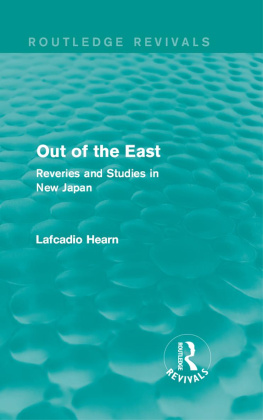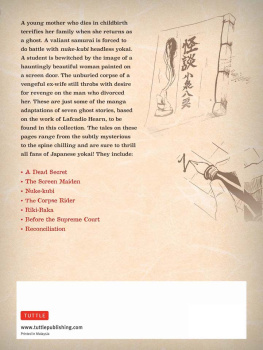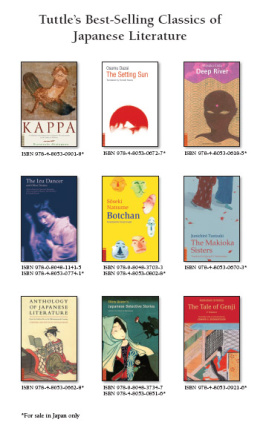First published in 1903
by Kegan Paul, Trench, Trubner & Co.
This edition first published in 2015 by Routledge
2 Park Square, Milton Park, Abingdon, Oxon, OX14 4RN
and by Routledge
711 Third Avenue, New York, NY 10017
Routledge is an imprint of the Taylor & Francis Group, an informa business
1903 Lafcadio Hearn
All rights reserved. No part of this book may be reprinted or reproduced or utilised in any form or by any electronic, mechanical, or other means, now known or hereafter invented, including photocopying and recording, or in any information storage or retrieval system, without permission in writing from the publishers.
Publishers Note
The publisher has gone to great lengths to ensure the quality of this reprint but points out that some imperfections in the original copies may be apparent.
Disclaimer
The publisher has made every effort to trace copyright holders and welcomes correspondence from those they have been unable to contact.
A Library of Congress record exists under LC control number: 49040953
ISBN 13: 978-1-138-91340-0 (hbk)
ISBN 13: 978-1-315-69149-7 (ebk)
OUT OF THE EAST
REVERIES AND STUDIES IN NEW JAPAN
BY
LAFCADIO HEARN
AUTHOR OF GLIMPSES OF UNFAMILIAR JAPAN
As far as the east is from the west
LONDON
KEGAN PAUL, TRENCH, TRBNER & CO., LTD.
OUT OF THE EAST
I
THE hotel seemed to me a paradise, and the maids thereof celestial beings. This was because I had just fled away from one of the Open Ports, where I had ventured to seek comfort in a European hotel, supplied with all modern improvements. To find myself at ease once more in a yukata, seated upon cool, soft matting, waited upon by sweet-voiced girls, and surrounded by things of beauty, was therefore like a redemption from all the sorrows of the nineteenth century. Bamboo-shoots and lotus-bulbs were given me for breakfast, and a fan from heaven for a keep-sake. The design upon that fan represented only the white rushing burst of one great wave on a beach, and sea-birds shooting in exultation through the blue overhead. But to behold it was worth all the trouble of the journey. It was a glory of light, a thunder of motion, a triumph of sea-wind, all in one. It made me want to shout when I looked at it.
Between the cedarn balcony pillars I could see the course of the pretty gray town following the shore-sweep, and yellow lazy junks asleep at anchor, and the opening of the bay between enormous green cliffs, and beyond it the blaze of summer to the horizon. In that horizon there were mountain shapes faint as old memories. And all things but the gray town, and the yellow junks, and the green cliffs, were blue.
Then a voice softly toned as a wind-bell began to tinkle words of courtesy into my reverie, and broke it; and I perceived that the mistress of the palace had come to thank me for the chadai,1 and I prostrated myself before her. She was very young, and more than pleasant to look upon, like the mothmaidens, like the butterfly-women, of Kunisada. And I thought at once of death; for the beautiful is sometimes a sorrow of anticipation.
She asked whither I honorably intended to go, that she might order a kuruma for me. And I made answer:
To Kumamoto. But the name of your house I much wish to know, that I may always remember it.
My guest-rooms, she said, are augustly insignificant, and my maidens honorably rude. But the house is called the House of Urashima. And now I go to order a kuruma.
The music of her voice passed; and I felt enchantment falling all about me, like the thrilling of a ghostly web. For the name was the name of the story of a song that bewitches men.
II
Once you hear the story, you will never be able to forget it. Every summer when I find myself on the coast, especially of very soft, still days, it haunts me most persistently. There are many native versions of it which have been the inspiration for countless works of art. But the most impressive and the most ancient is found in the Manyefushifu, a collection of poems dating from the fifth to the ninth century. From this ancient version the great scholar Aston translated it into prose, and the great scholar Chamberlain into both prose and verse. But for English readers I think the most charming form of it is Chamberlains version written for children, in the Japanese Fairy-Tale Series, because of the delicious colored pictures by native artists. With that little book before me, I shall try to tell the legend over again in my own words.
Fourteen hundred and sixteen years ago, the fisher-boy Urashima Taro left the shore of Suminoy in his boat.
Summer days were then as now, all drowsy and tender blue, with only some light, pure white clouds hanging over the mirror of the sea. Then, too, were the hills the same, far blue soft shapes melting into the blue sky. And the winds were lazy.
And presently the boy, also lazy, let his boat drift as he fished. It was a queer boat, unpainted and rudderless, of a shape you probably never saw. But still, after fourteen hundred years, there are such boats to be seen in front of the ancient fishing-hamlets of the coast of the Sea of Japan.
After long waiting, Urashima caught something, and drew it up to him. But he found it was only a tortoise.
Now a tortoise is sacred to the Dragon God of the Sea, and the period of its natural life is a thousand some say ten thousand years. So that to kill it is very wrong. The boy gently unfastened the creature from his line, and set it free, with a prayer to the gods.
But he caught nothing more. And the day was very warm; and sea and air and all things were very, very silent. And a great drowsiness grew upon him, and he slept in his drifting boat.
Then out of the dreaming of the sea rose up a beautiful girl, just as you can see her in the picture to Professor Chamberlains Urashima, robed in crimson and blue, with long black hair flowing down her back even to her feet, after the fashion of a princes daughter fourteen hundred years ago.
Gliding over the waters she came, softly as air; and she stood above the sleeping boy in the boat, and woke him with a light touch, and said:
Do not be surprised. My father, the Dragon King of the Sea, sent me to you, because of your kind heart. For to-day you set free a tortoise. And now we will go to my fathers palace in the island where summer never dies; and I will be your flower-wife if you wish; and we shall live there happily forever.
And Urashima wondered more and more as he looked upon her; for she was more beautiful than any human being, and he could not but love her. Then she took one oar, and he took another, and they rowed away together, just as you may still see, off the far western coast, wife and husband rowing together, when the fishing-boats flit into the evening gold.












